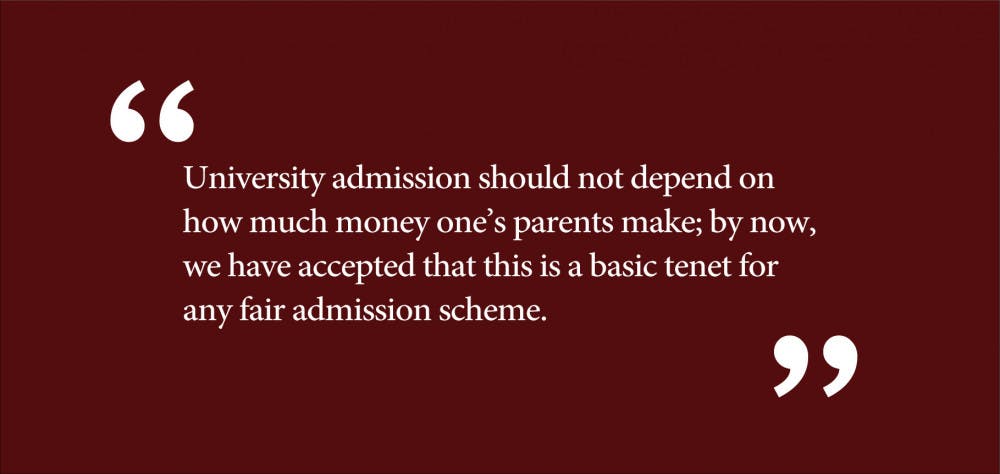In 2003, the University became need-blind for domestic, first-year applicants. This meant that Brown would not consider the wealth of an applicant (or their family) in granting admission. In this, Brown affirmed a core tenet of college admission: No candidate should be favored for coming from a rich family; no candidate should be harmed for coming from a poor one. President Emeritus Ruth Simmons, in developing the proposal, spoke of it as a moral obligation. It is an obligation that Brown has never upheld for transfer or international students. Because the international case involves further complications, I here address only the case of domestic transfer applicants. But I suspect very similar things can be said for international students.
Over 1,000 potential transfer students apply to Brown each year through a need-aware process, which means that the University can consider each applicant’s ability to pay when deciding whether to grant admission. For this reason, many apply without requesting financial aid, thereby promising to foot the sticker price of Brown each year they are here. This year, the total cost of attendance runs to $73,892. Since transfer students who do not apply for financial aid when they apply for admission are barred from ever receiving aid, those transfers are then required to meet that cost each year they attend.
For those who transfer in as sophomores, they will pay over $220,000 to graduate. That’s about three times the median net worth of an American household. Here’s another way to appreciate that sum: Around 70 percent of Americans could drain their entire bank account, sell their house, sell their car, sell their possessions, sell the literal clothes off their literal backs and still be unable to afford that.
Such a system flagrantly advantages those who come from families with means, treating unjustly those transfer applicants who must apply for aid if they are to attend Brown at all. This is wrong. University admission should not depend on how much money one’s parents make; by now, we accept that this is a basic tenet for any fair admission scheme. And while fixing this is not a panacea for all that ails college admission today, we can at least take one clear step in the right direction by making transfer admission need-blind.
Thus far, I have argued that Brown’s need-aware transfer policies are unjust. But perhaps such wrongs can be tolerated because they provide crucial funding that allows Brown to attract a truly diverse first-year class. With such a view, whatever injustice is dealt to transfer applicants can be justified by the fair treatment of first-year applicants and the opportunities provided to them.
This reply suffers from three faults. First, it is empirically unsupported; as of yet, there is no evidence to suggest that Brown requires the tuition payments of transfer students to subsidize its financial aid packages. Second, if this is truly a rationale the University wishes to adopt, it ought to make it publicly known. Would-be transfer applicants have a right to know that this is how Brown views them: as sources of funding for first-years. Third, even if we grant the empirical suppositions needed for this view, the morally right response will simply be to admit fewer students until we can afford to run a fair admission process. In this way, justice can be done to all.
Another objector may note that if transfer students are willing to pay the sticker price and Brown can use those funds to, say, promote diversity in higher education, why shouldn’t we adopt such a policy? Everyone stands to benefit.
My reply is that exactly similar considerations will hold for first-year admission. There too, we can set aside a portion of the seats for those who have the means to pay. In fact, we might even be able to rack up more funds as people spend all four years committed to Brown. But in fact, we should not do this. Why? Because it wrongs the applicants. So too for transfer applicants.
I close by addressing a third objection: the University cannot afford such a shift, given our paltry endowment. But here, I suspect the policy does more harm than good. If Brown expects to be financially solvent in the long-run, it must expect alumni to give, on average, more than they received in financial aid. I see no reason why such a supposition should not also hold for transfer applicants. As it stands, transfers who pay full sticker to attend may later find themselves wondering why they should donate to a school that never donated to them.
Recently, President Christina Paxson P’19 has promoted the “Brown Promise,” a commitment to replacing loans with University grants in financial aid packages. Given the recent hubbub surrounding the policy, I find it surprising that University administrators (and fellow students) have not directed more attention to this basic inequity in how Brown decides whom to admit. A policy we abandoned in 2003 lives on for transfer students.
Patrick Wu ’19 can be reached at patrick_wu@brown.edu. Please send responses to this opinion to letters@browndailyherald.com and op-eds to opinions@browndailyherald.com.





